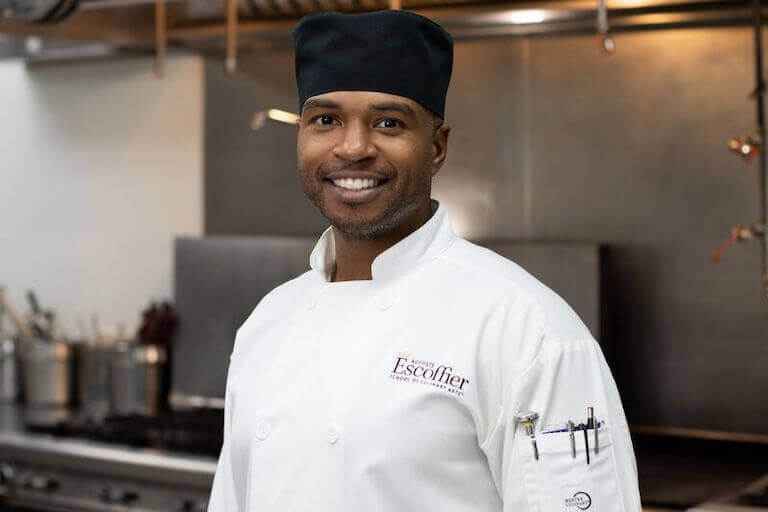So you want to start a food business!
Perhaps you dream of owning a restaurant, running a food truck, becoming a food stylist, or venturing into uncharted culinary territory. There’s only one thing standing between you and your goal–the skill set to make it happen.
While you don’t need to be an expert in every single area, a successful food entrepreneur should be competent and well-rounded in a number of areas.
If you’re ready to start planning your future as a food entrepreneur, here are five must-have skills (plus, the steps you can take to acquire them!):
1. Foundational Food & Kitchen Knowledge
They say the best coaches were once players.
Similarly, the best food business owners know their way around a kitchen. So, even if your ultimate goal is to hire skilled hands for your kitchen, foundational culinary knowledge is important to your success. Not only can a culinary education help you to know quality when you see (or taste) it, it can also be crucial to hiring and leading a team within the industry.
Additionally, it could provide the groundwork you need to bring your culinary ideas to fruition. Maybe you need to build a menu or test recipes. Maybe you hope to recreate classic dishes or invent something totally new! Maybe you aim to make a name as a food stylist, food blogger, or influencer. No matter which niche you intend to navigate, refining the best culinary methods is the first step.

Escoffier culinary students gain practical skills in the kitchen.
2. Maintaining Schedules & Meeting Deadlines
One out of five U.S. businesses fail within the first year, according to the U.S. Bureau of Labor Statistics. If that statistic doesn’t say it, managing everyday operations is a highly essential skill for food business owners–and it all comes down to organization!
Holden O’Leary, Executive Chef of Jolynn’s Food & Spirits and an Escoffier graduate, credits the organizational skills he gained in culinary school as a huge part of his success. “Escoffier did a really great job when it came to their entrepreneurial classes,” he said. “It taught me the organization part of owning a restaurant.”*
Whether you gain these skills as a student or on your own, managing things like food safety compliance, inventory, and employee schedules may require top-tier organization. Entrepreneurs should have good time management skills. With so many moving parts, entrepreneurs should practice maintaining a detailed schedule and to-do list. When working with a team, many leaders rely on apps or online tools to help them stay on task and establish deadlines.
You might love paper lists, but find that digital tools work better for a team. Or maybe you work best with visual props and need to create a physical command center, writing to-do’s on a dry-erase board for all to see.
Whatever the tool, staying organized and completing tasks in a timely manner can be essential skills for any entrepreneur.
“I think that every professional chef is a balance of lots of experience and lots of education. My education with Escoffier has filled a skills gap. Now I don’t just have the experience of running restaurants, but I have the education to back it up.”*
Lance McWhorter, Escoffier Online Graduate; Executive Chef/Owner, Culture ETX; Food Network’s “Chopped” Contestant
3. Confident and Effective Communication
A plan is only as strong as how it’s communicated. As a food entrepreneur, you will likely need to communicate frequently with employees, customers, investors, and other potential stakeholders. Often, your pitch is the first and only impression investors will have of your business. You never know when you’ll meet a potential partner, so it’s good to be prepared. You should be able to confidently answer important questions about your business model, market positioning, profitability, and how you plan to operate your business.
Communicating a compelling “why” behind her business was the key to Escoffier online graduate, Tiffany Moore’s success. In 2021, the medically-discharged U.S. Army Veteran won $25,000 to launch her dream restaurant after powerfully communicating her mission to combat veteran suicide and “feed life” with a new restaurant in Georgia.*
Additionally, effective communication skills also apply to how you engage with customers, critics, and employees. When leading a team, you may often be required to give constructive feedback or mentor others. Being able to have difficult conversations, inspire others, and clearly convey your ideas is an essential skill for successful entrepreneurs.

Leaders use consistent, open communication with their team to set the right tone for their business.
4. Managing Finance & Accounting
Understanding the financial side of your business is another important aspect of food entrepreneurship. Essential skills can include how to set up and maintain an accounting system as well as how to manage payroll and create correct financial statements.
Such accounting skills enable you to know where your business stands at all times. With the right math and accounting skills you can answer questions like, is my business profitable? Where do I need to cut back? Where can I afford to spend more? It also helps ensure that your employees will be paid correctly and on time, and that you don’t necessarily encounter those not-so-fun surprises during tax season.

Business owners should be prepared with basic financial skills, like balancing accounts and managing payroll, to help them run the business and avoid surprises at tax time.
5. Cultivating Adaptability (and Grit!)
You’ve likely heard the phrase, “expect the unexpected.” It often doesn’t take long for entrepreneurs to learn this firsthand. Even the best planners can encounter things that are outside of their control. It could look like changes in rent, employee turnover, public health concerns, or urgent personal needs.
The keys in weathering such changes may be a little adaptability, and a whole lot of grit! Successful entrepreneurs are problem solvers who can adapt to the ever-changing culinary climate. Keeping their big-picture vision in mind, they face challenges with determination, knowing that problems can pass as quickly as they come.
One way to strengthen your adaptability is to surround yourself with others who understand your journey. Networking within the culinary community can help provide you with the resources and moral support you need to conquer the inevitable challenges of entrepreneurship. Each time you face a challenge, look at it as an opportunity to build resilience. After all, every problem solved brings you one step closer to accomplishing your dream!
Bonus: Becoming a Leader People Want to Follow
We’ve all likely had a bad manager at some point in our careers. The key is not to become one! But becoming a good manager doesn’t happen automatically. Leadership is a skill that must be learned. At Escoffier, we can help demonstrate future entrepreneurs the hierarchy of management in food service. This can include how to train and motivate employees and how to create a safe and positive work environment.
But true leadership isn’t a formula from a book. It is a daily commitment to qualities like competence, courage, and integrity. People trust leaders who do what they say they will do, when they say they will do it. They follow leaders who don’t just talk about their values but practice them, too.
Remember, you don’t have to be in a high-level role to develop leadership. In fact, the truest traits of a good leader start small. It can start with who you are at home and work, and applies to the leadership of small teams as well. Wherever you are now, you can begin laying the foundation of leadership for your future business.

Ongoing personal development encourages growth for entrepreneurs and their businesses.
Plan Your Next Step as a Food Entrepreneur
Now, you can begin taking the next steps towards becoming a food entrepreneur–one skill at a time. Escoffier’s hands-on industry externships can help connect students with opportunities to work in the culinary field, practicing skills parallel to their studies. This hands-on experience may mirror your future work in the industry and give you the chance to test the skills listed above in a less-risky but equally real-world environment. Those who opt for a different approach can gain experience by seeking part-time jobs in a kitchen, front-of-house, or hospitality role.
Escoffier also offers two online programs for food entrepreneurs: the Food Entrepreneurship Diploma and the more in-depth Food Entrepreneurship Associate Degree. These online options are built for people with big ideas and busy schedules. Reach out to one of our advisors to learn more about how Escoffier can help empower your entrepreneurial journey.
If you’re planning to launch a food business, these articles might be helpful:
- Restaurant Marketing 101: An Essential Guide
- What Licenses and Permits Do You Need to Start a Restaurant?
- How to Open a Bakery: 6 Steps to Success
*Information may not reflect every student’s experience. Results and outcomes may be based on several factors, such as geographical region or previous experience.

 “I think that every professional chef is a balance of lots of experience and lots of education. My education with Escoffier has filled a skills gap. Now I don’t just have the experience of running restaurants, but I have the education to back it up.”*
“I think that every professional chef is a balance of lots of experience and lots of education. My education with Escoffier has filled a skills gap. Now I don’t just have the experience of running restaurants, but I have the education to back it up.”*

